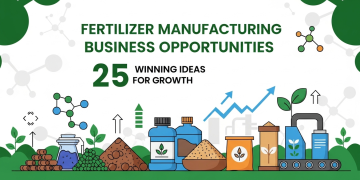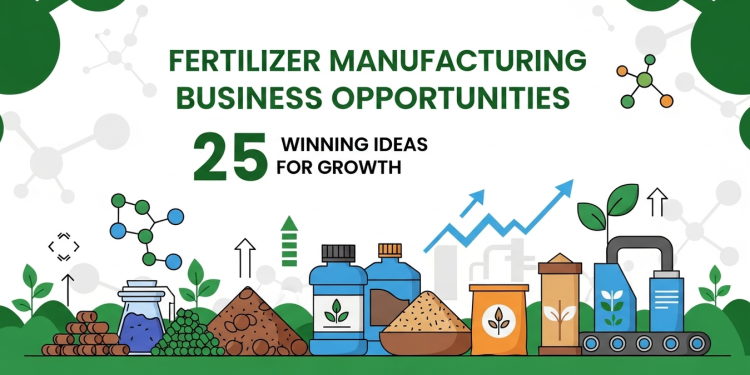Fertilizer Manufacturing Business plays a vital role in ensuring global food security and sustainable farmingFood security and farming depend on the fertilizer industry. The world is increasing, and with an increased population, food is required; hence, the farmer needs more food per land, which is achieved with the use of fertilisers. India consumes the 2 nd highest among nations on the earth in fertilizers, with an annual demand of over 60 million tonnes of crops such as rice, wheat, maize, and sugarcane. Thanks to the key nutrients, including NPK, urea, and DAP, the global market to which these products are major companies of the nutrients demands will go beyond USD 250 billion by the year 2030.
The article examines some good ideas to prepare and process inorganic fertilisers, nitrogen-based fertilisers, macronutrients, micronutrients, SSP, urea, and DAP. It provides the startups with an outline of how to explore this significant area.

25 Profitable Fertiliser Manufacturing Business Ideas
1. Fertilizer manufacturing NPK.
It is an excellent enterprise in the fertiliser sector. NPK fertiliser is applied to most crops, and there is huge support from the government. The projects are expandable and can export to foreign markets. Subsidies, new technology, as well as the increasing international demand can help businesses to develop durable and long-term operations.
2. Single Super Phosphate (SSP)
SSP has a good future in the fertiliser market. It benefits numerous crops, and it is strongly supported by the government. One can expand and export projects. Entrepreneurs have an opportunity to establish trustworthy enterprises due to subsidies, upgrades in technology, and global demand.
3. Urea Production
Fertiliser businesses have a great opportunity in the production of urea. It is applied to the majority of crops, and it has high government support. Projects are able to bring about production and concentrate on export. Subsidies, improved technology, and increased world demands can be used to advantage in creating a sustainable operation by entrepreneurs.
4. Diammonium Phosphate (DAP)
The fertiliser industry has good attractiveness in DAP as an investment. It gives much aid to various crops, and it also has good government support. It is possible to scale up the projects and export them. Growers establish stable ventures with the aid of subsidies, state-of-the-art technology, and the world market.
5. Sulphuric Fertiliser (ammonium Sulphate).
The business of Ammonium sulphate is very good. It has found good support in other crops as well, and it is well-established by the government. Projects develop and also target overseas markets. Support for entrepreneurship is in terms of subsidies, technology modernisation, and the growing global demand.
6. Calcium Ammonium Nitrate (CAN) Users
A good fertiliser production field. It is beneficial to a large number of crops and is backed by the government. Projects may be large and have export potential. The development of sustainable ventures depends on such aspects as subsidies, new technology, and international requirements.
7. Triple Super Phosphate (TSP)
TSP offers a strong future for the business in fertilisers. It has positive effects on numerous crops, as well as is officially encouraged. Projects have an opportunity to develop an export. It is possible to manage by using subsidies, better technology, expanding the global market, and making stable businesses.
8. Nitrogen Fertiliser Units
It is a good choice to have units of nitrogen fertilisers. They are versatile and highly supported in the government. Projects are scalable and exportable. With the assistance of subsidies, technology, and demand around the world, start-up businesses become viable.
9. Phosphatic Fertilizers
Phosphatic fertiliser provides a good business opportunity. It favours numerous crops and is approved at the government level. Projects can grow and export. With the help of subsidies, technology, and an augmenting global demand, it is permissible to establish sound businesses.
10. Potash Fertilizers
Potash fertiliser may be a lucrative business. It operates on most crops, and it is assisted by the government. Exporting projects can be seen as an expansion. It is essential to use subsidies, superior technology, and a more global necessity to achieve sustainable growth.
Related Article: Start Biofertilizer Manufacturing Business
11. Fertiliser Mixes consisting of micronutrients.
The option that is a good business is the Micronutrient mixes. They affect various crops, as well as have very good support from the government. Projects would be able to expand and focus on exportation. The increasing global demand, the use of technology, and subsidies allow business entrepreneurs to establish strong enterprises.
12. Zinc Sulphate Fertiliser
Zinc sulphate manure is a potential company. It is fertile and has governmental sanction. Projects may be scaled to attack the export market. A stable business is built with the aid of subsidies, technological innovations, and the increasing demand in the world.
13. Boronated Fertilizers
A good opportunity is afforded in Boronated fertilisers. The government supports them, and many crops are supported. Projects can grow and export. Subsidy, new technology, and global demand are useful in the formation of predictable businesses.
14. Chelated Micronutrients
There is a money-making opportunity in chelated micronutrients. They are beneficial to several crops and are highly supported by the government. The projects are expandable and exportable. The subsidies, technological modernisation, and demands in other countries help to create sustainable ventures.
15. Water-Soluble Fertilizers
Fertilisers that can dissolve in water automatically are a good business. They cultivate numerous crops and are also assisted by the authority. It can expand its projects and specialise in exports. With the use of subsidies, enhanced technology, and increased pressure on global demand, sustainable operations are made possible.
16. Granulated Fertilizers
One of the solid business alternatives is in the form of granulated fertilisers. They support various crops and can be supported by the government. Projects can grow and export. Subsidies, improvement of technology, and the usage of the global demand are useful in making reliable ventures.
17. Inorganic and Bio-Fertilizers
Bio-Fertilisers Blended with Inorganics Bio-Fertilizers Blended with Inorganics There is an opportunity to do a combination of bio-fertilisers and inorganic ones. It promotes numerous crops, and it is well-assisted by the government. Projects are capable of growth, expansion, and export. Entrepreneurs can establish sustainable businesses because of the presence of subsidies, technological advancement, and the demand in the global market.
18. Slow and Controlled Release Fertilisers.
Slow-release manure comprises an attractive business. They cultivate a very diverse range of crops and are well supported by the government. Projects may be large and have export potential. The major keys to success include subsidies, technology, and an increasing demand throughout the world.
19. Liquid Fertiliser Units
A good prospect is the liquid fertiliser units. They grow numerous varieties of crops and are officially endorsed. Projects may grow in size, and they target export markets. Sustainable operations are formed with the help of supplements, technological updates, and global demand.
20. Fertiliser blends will be modified to be customised.
Having customised blends is a viable way to do business. They satisfy the requirements of different crops and have the support of the government. The projects can expand, export, and remain competitive. The entrepreneur also supports a sound venture through subsidies, technology, and an increasing demand.
21. Fertiliser Packaging Units
Fertilisers are a good business in packaging units. They enhance numerous commodities and go with the state. It is possible to scale and export projects. Subsidies, superior technology, and international demand are some of the factors that contribute to developing trustworthy businesses.
22. Additives and Coating Fertilisers.
Fertilisers have a good opportunity in terms of the coating and additives. They facilitate a myriad of crops and are well aided by the government. Projects are able to be expanded and aim at export. Sustainable businesses are created based on subsidies, technological improvements, and global need.
23. Export-Oriented Projects on Fertiliser.
The highly profitable route is to use export-oriented fertiliser projects. They are used in the support of numerous crops, and well as being government-supported. It is possible to scale and export projects. The aid of subsidies, technological growth, and increasing worldwide demand aids in entrepreneurship to establish business ventures that are sustainable.
24. Fertilisers made of ammonium green.
A potential business is the utilisation of green ammonia-based fertilisers. They support numerous crops as well, and they are supported by the government. Projects are capable of expanding and exporting to foreign markets. Equipping with subsidies, modern technology, and increasing world demand creates sustainable operations.
25. Multi-Product Integrated Fertiliser Plants.
There is an opportunity for multi-product integrated fertilisers. They also grow a great variety of crops and are supported by the government. Project to grow, encompass a large range of products, and make exports. Long-term success comes in the form of subsidies, technological advances, and rising worldwide demand.
Find all of our books here.
How NPCS Supports Fertiliser Ventures?
We at NIIR Project Consultancy Services (NPCS) provide professional consulting for the preparation of Market Survey cum Detailed Techno-Economic Feasibility Reports (DPRs) for setting up new industries or businesses. Our reports include:
• Detailed manufacturing process
• Market research and demand analysis
• Process flow diagrams
• Product mix and capacity planning
• Machinery and raw material details
• Full project financials and profitability analysis
Our aim is to support entrepreneurs in evaluating the feasibility, profitability, and scalability of industrial projects, ensuring they make informed investment decisions and achieve long-term success.
Find the Best Idea for Yourself With our Startup Selector Tool
Conclusion
The fertilizer sector offers robust business opportunities, with rising demand from further agricultural production industries. From NPK and urea to micronutrient blends and green ammonia-based fertilisers, the scope for startups is extensive. India’s strong domestic market, coupled with export growth, ensures profitable ventures for entrepreneurs. With NPCS’s consulting expertise, startups can build efficient, profitable, and globally competitive fertilisers.
For more information, check out this Related video.
Frequently Asked Questions(FAQ)
Q1. Is the fertilizer manufacturing business profitable in India?
Yes, the fertilizer manufacturing business in India is highly profitable due to increasing agricultural demand, government subsidies, and export potential.
Q2. What are the main types of fertilizers used in India?
The main fertilizers are NPK, urea, DAP, SSP, and micronutrient mixes. New trends include bio-fertilizers and green ammonia-based fertilizers.
Q3. How much investment is required to start a fertilizer manufacturing business?
Investment depends on the project scale. A small-scale plant may need ₹50–₹75 lakhs, while a medium-to-large unit can exceed ₹5 crores.
Q4. What licenses are needed for fertilizer manufacturing in India?
Entrepreneurs need a Fertilizer Manufacturing License under the Fertilizer Control Order (FCO), pollution control certification, and business registration.
Q5. What is the future of the fertilizer manufacturing business in India?
With rising food demand, technological innovations, and green fertilizer initiatives, the fertilizer manufacturing business has strong long-term growth prospects.


















